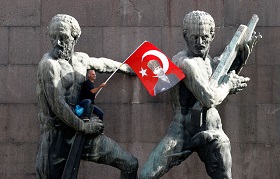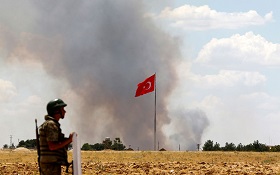Ankara has been once again targeted by a suicide bombing that killed 37 and injured tens of civilians. The wave of bombing attacks in Ankara can be considered as a direct result of the Turkish approach of the Syrian conflict which has turned Turkey into a second stage player on the diplomacy level, while it had critical political capital and influence to play a leading role in solving the crisis. Nevertheless, Ankara has considered from the very beginning the Syrian crisis as a “domestic problem”, seeing it through the prism of the Kurdish issue.
Ankara has been once again targeted by a suicide bombing that killed 37 and injured tens of civilians. The Kurdistan Freedom Falcons (TAK) claimed the responsibility for the attack. This is the second operation carried out by the TAK in the Turkish capital after the February 17 suicide bombing which left 29 dead and wounded 61. In December, the TAK claimed also the responsibility for another attack on Istanbul’s Sabiha Gokcen airport, which the group shelled with a mortar, killing one employee and injuring another. These attacks have been presented by the TAK as a response against the security operations undertaken by the Turkish army on the southeastern part of the country against the Kurdistan Workers Party (PKK). According to the TAK, recent counter-insurgency operations have reportedly killed 300 Kurds in the area of Cizre. Soon after the attack, Turkish government ordered its air forces to carry out several strikes on PKK’s military camps in Northern Iraq, acknowledging the de facto responsibility of the Kurdish rebels in the suicide bombing.
The TAK has been reportedly created by the PKK a decade ago, and has been tasked to carry out attacks in Western Turkey, outside of PKK’s usual area of operation. While the PKK generally targets Turkish military objectives in which civilian casualties are supposedly low, the TAK on the contrary attacks civilian places and objectives in order to get the maximum death toll. However, it seems that the relations between the PKK and the TAK – both considered as terrorist groups by the Unites States (US) and the European Union (EU) – have been severed due to political disagreements. Although the TAK has still pledged loyalty to Abdullah Ocalan, the jailed PKK leader, there had been deep divergences over the peace process the Turkish government and the PKK had been engage in until it collapsed last year, together with the 2-year ceasefire. Since then, the TAK has remained semi-autonomous, still relying on the PKK for financing, ideology, logistics, training and recruitment, and weapons supplies. However, the TAK seems to have gained enough autonomy to decide independently upon what and when to strike.
These attacks have confirmed the ability of the TAK to carry out attacks at the very heart of the Turkish capital. In 2012, the TAK already assaulted a Turkish military bus, killing two servicemen and injuring a dozen, on a coastal resort. These operations are aimed to expand the area of action of the Kurdish rebellion beyond the Turkish Kurdistan. This region has been on a state of quasi insurgency since last summer, after the fighting resumed between the Turkish army and the PKK in July 2015. Since then, the Turkish army has conducted counter-guerilla operations in the region. The general staff of the People’s Protection Units (YPG), the military branch of the Syrian Kurdish Democratic Union Party (PYD), reported the recent death of 27 Turkish soldiers during combats in the area of Sirnak, Gever and Nusaybin, three small cities located near the Syrian-Turkish border. From Ankara’s perspectives, the rising violence is a direct backlash of Syrian conflict where the PYD, an offshoot of the PKK, has gained international legitimacy, combat experience and autonomy over its fight against jihadist groups. The Syria-Turkey border has grown increasingly porous during the 5 past years, and Turkish authorities considered the Rojava (Syrian Kurdish de facto autonomous republic) as a haven for PKK fighters. The PYD controls an uninterrupted 400 km long land strip along the Turkish border, from the Euphrates river to Iraq. It also has the control of the region of Afrin, in northwestern Syria.
On March 17, Syrian Kurds have declared a federal region in northern Syria that unites the three Kurdish cantons (Kobani, Afrin and Jazira), while including Kurdish representatives from northern Aleppo. The PYD has insisted its political project has been set on a territorial basis, not on an ethnical nor a religious one, arguing that other minorities (Christians, Arabs…) are intended to be politically represented in Rojava. Ankara, which considers Syrian Kurds’ ambitions as fueling Kurdish separatism in Turkey, is set to consider this move as hostile. This move might be interpreted as an attempt of the Syrian Kurds to buy their way in the Geneva peace process from which they have been so far excluded due to Turkish pressure. The political message would be: “keep on ignoring us, and we will determine our future by ourselves”.
The wave of bombing attacks in Ankara can be considered as a direct result of the Turkish approach of the Syrian conflict which has turned Turkey into a second stage player on the diplomacy level, while it had critical political capital and influence to play a leading role in solving the crisis. Nevertheless, Ankara has considered from the very beginning the Syrian crisis as a “domestic problem”, seeing it through the prism of the Kurdish issue. Rising tensions with Moscow, after the downing of the Su-24 by Turkish air force on November 2015, has further complicated the problem for Ankara. Moscow has since then enhanced its military cooperation with the YPG (which has enjoyed military support from the US and from some EU countries), and has recently supplied weapons to Iraqi Kurds, including anti-aircraft cannons and shells. Future attacks are expected to take place in Turkey as the government, embarked in a punitive rhetoric, gives no signs of backing down. On the contrary, President Erdogan stated, in a speech delivered a day after the attack, that “There is no difference between a terrorist with a gun and bomb in his hand and those who use their work and pen to support terror”. The creation of the Syrian Kurdish federation is likely to further fuel this hard-line stance.






